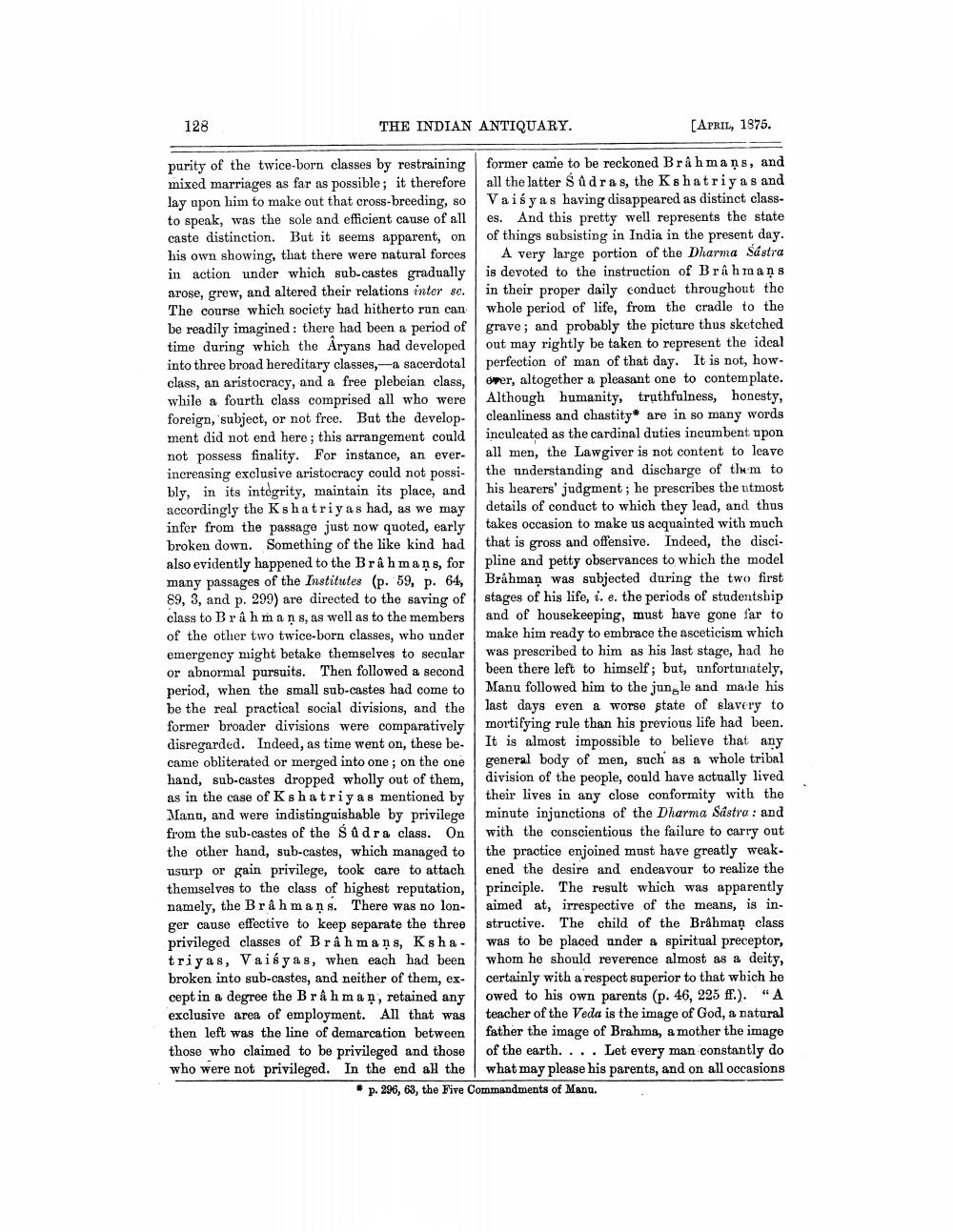________________
128
THE INDIAN ANTIQUARY.
[APRIL, 1875.
purity of the twice-born classes by restraining former came to be reckoned Brahmaņs, and mixed marriages as far as possible; it therefore all the latter Sudras, the Kshatriyas and lay upon him to make out that cross-breeding, so Vaisy as having disappeared as distinct classto speak, was the sole and efficient cause of all es. And this pretty well represents the state caste distinction. But it seems apparent, on of things subsisting in India in the present day. his own showing, that there were natural forces A very large portion of the Dharma Sastra in action under which sub-castes gradually is devoted to the instruction of Brah mans arose, grew, and altered their relations inter se. in their proper daily conduct throughout the The course which society had hitherto run can whole period of life, from the cradle to the be readily imagined: there had been a period of grave; and probably the picture thus sketched time during which the Aryans had developed out may rightly be taken to represent the ideal into three broad hereditary classes,--a sacerdotal perfection of man of that day. It is not, howclass, an aristocracy, and a free plebeian class, oper, altogether a pleasant one to contemplate. while a fourth class comprised all who were Although humanity, truthfulness, honesty, foreign, subject, or not free. But the develop- cleanliness and chastity* are in so many words ment did not end here ; this arrangement could inculcated as the cardinal duties incumbent upon not possess finality. For instance, an ever- all men, the Lawgiver is not content to leave increasing exclusive aristocracy could not possi- the understanding and discharge of them to bly, in its integrity, maintain its place, and his hearers' judgment; he prescribes the utmost accordingly the Kshatriyas had, as we may details of conduct to which they lead, and thus infer from the passage just now quoted, early takes occasion to make us acquainted with much broken down. Something of the like kind had that is gross and offensive. Indeed, the disci. also evidently happened to the Brahmaņs, for pline and petty observances to which the model many passages of the Institutes (p. 59, p. 64, Brahman was subjected during the two first 89, 3, and p. 299) are directed to the saving of stages of his life, i.e. the periods of studentship class to Brah mans, as well as to the members and of housekeeping, must have gone far to of the other two twice-born classes, who under make him ready to embrace the asceticism which emergency might betake themselves to secular was prescribed to him as his last stage, had he or abnormal pursuits. Then followed a second been there left to himself; but, unfortunately, period, when the small sub-castes had come to Manu followed him to the jun, le and made his be the real practical social divisions, and the last days even a worse state of slavery to former broader divisions were comparatively mortifying rule than his previous life had been. disregarded. Indeed, as time went on, these be- It is almost impossible to believe that any came obliterated or merged into one ; on the one general body of men, such as a whole tribal hand, sub-castes dropped wholly out of them, division of the people, could have actually lived as in the case of Kshatriyas mentioned by their lives in any close conformity with the Manu, and were indistinguishable by privilege minute injunctions of the Dharma Sastra : and from the sub-castes of the sadra class. On with the conscientious the failure to carry out the other hand, sub-castes, which managed to the practice enjoined must have greatly weakusurp or gain privilege, took care to attach ened the desire and endeavour to realize the themselves to the class of highest reputation, principle. The result which was apparently namely, the Brahmans. There was no lon- aimed at, irrespective of the means, is inger cause effective to keep separate the three structive. The child of the Brahman class privileged classes of Brahmans, Ksha. was to be placed under a spiritual preceptor, triyas, Vaisyas, when each had been whom he should reverence almost as a deity, broken into sub-castes, and neither of them, ex- certainly with a respect superior to that which he cept in a degree the Brahman, retained any owed to his own parents (p. 46, 225 ff.). "A exclusive area of employment. All that was teacher of the Veda is the image of God, a natural then left was the line of demarcation between father the image of Brahma, a mother the image those who claimed to be privileged and those of the earth. ... Let every man constantly do who were not privileged. In the end all the what may please his parents, and on all occasions
* p. 296, 63, the Five Commandments of Manu.




